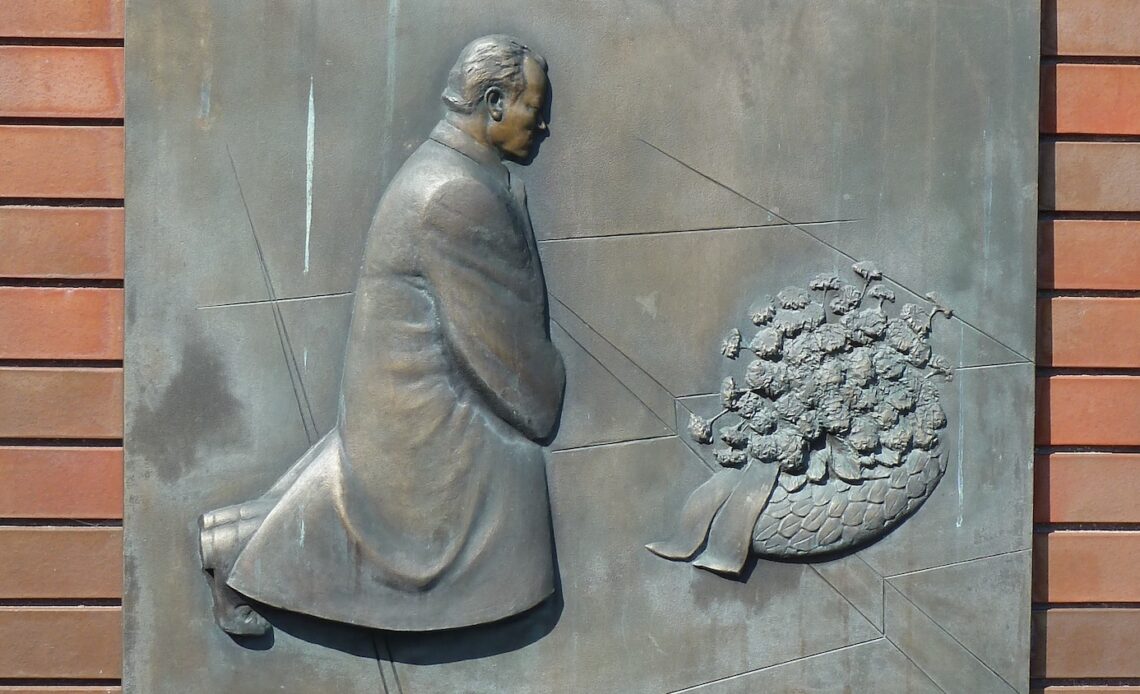
Published on 19 July 2023
For my husband and I, there is a certain matter in our marriage that we keep disagreeing about: apologies. Specifically, when an apology is due and how an apology needs to be phrased. Is an apology only necessary when you did something morally wrong? Or also when your action has had a (perceived) negative impact on the other? Is an apology necessary even when the action itself is permissible and you had the best intentions?
In all these questions, two things are certain: apologies in relationships are of the greatest importance, and yet apologizing (first) remains a challenging step.
If apologies are already so complex in interpersonal relationships, how much greater is their complexity between nations or people groups for historic wounds?
We might all agree that rulers or governments should apologize for past injustices, but state apologies are a fickle matter. How can a current government or ruler apologise for past crimes, ones that happened before their rule or even before their birth?[1] This is further complicated by the fact that state apologies mean that survivors or families of victims can demand reparations. Why would a current government/ruler make a financially (and therefore politically) detrimental decision to amend a past ruler’s crimes? In many cases, they don’t, as that would mean political suicide.
But on 1 July of this year, King Willem-Alexander emotionally apologized for the Dutch royal family’s involvement in and lack of action against slavery:[2]
“We know that more than 600,000 people were transported across the Atlantic Ocean from Africa aboard Dutch ships, to be sold as slaves or put to work on plantations. Around 75,000 did not survive the crossing. We also know about the extensive slave trade to the East, in areas controlled by the Dutch East India Company. And we know about the atrocities committed against the indigenous populations of the colonies. […]
On 19 December last year, the Dutch prime minister apologised on behalf of the Dutch government for the fact that, for centuries, in the name of the Dutch State, human beings were made into commodities, exploited and abused. Today I stand before you. Today, as your King and as a member of the government, I make this apology myself. And I feel the weight of the words in my heart and my soul. […]
But for me, there is another personal dimension. Slavery and the slave trade are recognised as a crime against humanity. And the Stadholders and Kings of the House of Orange-Nassau did nothing to stop it. […] today, on this day of remembrance, I ask forgiveness for the clear failure to act in the face of this crime against humanity.[3]“
The apology was met with cheers and clapping among the audience, who were mostly descendants and migrants from the colonized countries. You can also sense relief, as if a hard task had just been finished.
Why was this such a momentous occurrence? Why have so many other governments, leaders, and rulers not apologized?
Typically, when apologies are demanded of a government concerning historical injustices, the leadership has several options: they can either deny responsibility, acknowledge it, issue a statement of regret, or give an apology.[4] An acknowledgement alone excludes remorse, and a statement of regret does not necessitate reparations, which aim to somewhat mend the injustice with monetary or non-monetary means.[5]
The chosen stance or the weight of the state apology will in most cases be a calculated political decision: while the individuals or collectives that have suffered harm will be approaching the apology from an emotional point of view, based on experience, the government will be doing an unemotional cost-benefit-analysis.[6]
The cost of an apology includes, as already mentioned, reparations, as well as the tarnishing a national reputation, a financial cost at having to ‘correct’ national history and narratives, the necessity of further investigations (and further findings requiring more apologies), criticism from excluded groups, and criticism from a majority of citizens (therefore often political suicide).[7]
The benefit of an apology is the relief of international pressure (for example, from former colonies) and gaining international allies, moral reputation, damage control if the alternative are lawsuits, a more secure and safe environment for survivors in the state, and the possibility of healing and reconciliation, improving “the national spirit and health.”[8]
In some ways, this apology did not cost King Willem-Alexander a lot politically. He will remain king—that wasn’t really up for debate—and the Dutch prime minister, Mark Rutte, had formally apologised for the Dutch government’s role in slavery in December 2022.[9] Though Rutte’s apology was not uncontroversial among Dutch citizens, he paved the way (and set an expectation) for King Willem-Alexander’s apology.[10]
However, the king’s apology was still unbelievably important. Why?
Harriet Lerner, clinical psychologist, and author of Why Won’t You Apologize? Healing Big Betrayals and Everyday Hurt, believes that “I’m sorry” are the most important words in any language. “When they’re done right, apologies are very healing. But when apologies are absent or they go south, it will compromise or lead to the end of a relationship. Apologizing is central to everything we hold dear—to family, to marriage, to leadership, to parenting, to our ability to love ourselves and love other people.”[11]Similarly, many scholars are adamant about the fact that state apologies and reparations are crucial to the healing process of victimized groups, and vital to repairing relationships in and between nations.[12]
Therefore, the withholding of an apology and the issuing of insincere apologies keeps reinforcing the damaging political identities and delaying reconciliation between nations. The struggle for an adequate apology further deepens the divide between ‘us’ and ‘them’.
For example, on 9 July, Ukrainian President Zelensky and Polish President Duda participated in a memorial service for (largely Polish) victims of the Volhynia massacres—of which Ukrainian extremists were the main perpetrators.[13] They both posted the same text on Twitter: “Together we pay tribute to all the innocent victims of Volhynia! Memory connects us! Together we are stronger.”[14] (translated)
However, an apology has to date never been offered. This is something that survivors and descendants of the massacre’s victims have pleaded for again and again.[15] Further, Polish prime minister, Mateusz Morawiecki, stated on the occasion of the memorial: “We must be aware, Poles and Ukrainians, that without the full clarification and full record of the Volhynia crimes, Russia will always be using this card to drive a wedge between Poles and Ukrainians.”[16]
An absent apology also has power. And sadly, lovely words of regret or solidarity do not constitute an apology.
Esteemed relationship therapists Esther Perel and Mary Alice Miller say in their article “The Power of Apologizing: Relearn How to Say ‘I’m Sorry’” that a good apology includes:
- awareness of what you did
- responsibility for how you behaved
- acknowledgment of the impact this had on the other person—even if they hurt you, too.
From this place, you can stand accountable without needing the other person to validate, redeem, or forgive you. You just do your part, for the good of the relationship.[17]
So, I want to conclude with two thoughts for this week:
- Let us become better apologizers to our friends and family, at our work, in our faith groups, and with our neighbours. (If you want to become an excellent apologiser, I highly recommend Perel and Miller’s article, as well as Lerner’s Why Won’t You Apologize? Healing Big Betrayals and Everyday Hurts.)
- Let us look critically at how our country, our past leaders, have contributed to violence and injustice. Let us hold our own nations accountable and encourage our leaders to apologise for past crimes. It is (also) the responsibility of citizens to communicate to governments the necessity of making long-lasting changes to unjust socioeconomic structures, caused by past values and choices. If the majority of a society is in agreement, even at their own expense, the government will have to yield and cooperate. And let us be wary of state apologies that are issued in order to forget and appear moral, instead of taking up the hard task of remembrance and change.
I end with the way in which King Willem-Alexander ended his speech, and the anthem of the Surinamese liberation, celebrating the end of slavery:
Ten kon drai
Times have changed
Den keti koti, brada, sisa
The chains are broken, brother, sister
Ten kon drai
Times have changed
Den keti koti, fu tru!
The chains are broken, it’s true![18]
[1] This is not just a rhetorical question, but a philosophical conundrum.
[2] King Willem-Alexander, 1 July 2023, Apology for Slavery. For the speech, watch: https://nos.nl/collectie/13940/video/2481040-kijk-hier-de-hele-toespraak-met-excuses-van-de-koning-terug
[3] Translated Transcript: https://nltimes.nl/2023/07/01/full-english-text-king-willem-alexanders-speech-apologizing-history-slavery-0#:~:text=Today%2C%20as%20your%20King%20and,as%20a%20crime%20against%20humanity.
[4] Wolfe, S., 2014. The Politics of Reparations and Apologies, New York: Springer, p. 74.
[5] Brooks, R., 1999. ‘The Age of Apology’, in R. Brooks (ed.) When Sorry Isn’t Enough: The Controversy over Apologies and Reparations for Human Injustice, New York and London: New York University Press, p. 8.
[6] Derrida, J., 1977. On Cosmopolitanism and Forgiveness, London and New York: Routledge, p. 40. // Blatz, C., Schumann, K. & Ross, M., 2009. ‘Government Apologies for Historical Injustices’, International Society of Political Psychology, 30(2), p. 236.
[7] Citizens might be critical, as they do not feel responsible for past crimes, though apologies on behalf of institutions (the government, the royal family) are less controversial.
[8] Brooks 1999: p. 3.
[9] Mark Rutte, 19 December 2022, “Government apologises for the Netherlands’ role in the history of slavery”: https://www.government.nl/latest/news/2022/12/19/government-apologises-for-the-netherlands-role-in-the-history-of-slavery#:~:text=In%20a%20speech%20this%20afternoon,up%20to%20the%20present%20day
[10] BBC News, 19 December 2022, “Netherlands slavery: Saying sorry leaves Dutch divided”: https://www.bbc.com/news/world-europe-63993283
[11] See Esther Perel & Mary Alice Miller, “ The Power of Apologizing: Relearn How to Say ‘I’m Sorry’”: https://www.estherperel.com/blog/the-power-of-apologizing-relearn-how-to-say-im-sorry
[12] See: Tavuchis, N., 1991. Mea Culpa, Stanford, CA: Stanford University Press. // Barkan, E., 2000. The Guilt of Nations: Restitution and Negotiating Historical Injustices, New York and London: W. W. Norton & Company. // Minow, M., 2002. Breaking the Cycles of Hatred, Princeton, NJ: Princeton University Press. // Lazare, A., 2004. On Apology, New York: Oxford University Press.
[13] See, for example: New York Times, 21 May 2019, “Recovering the Memories of a 1943 Massacre in Eastern Europe”, https://www.nytimes.com/2019/05/21/lens/poland-ukraine-volhynia-massacre.html
[14] https://twitter.com/ZelenskyyUa/status/1677961432258736133
[15] See, for example: Andrew Higgins, New York Times, 10 July 2023, “A Tangled Past Complicates Poland’s Welcome to Ukrainian Refugees”: https://www.nytimes.com/2023/07/10/world/europe/ukraine-poland-volhynia-massacre-history.html // Christiaan Paauwe, NOS, 9 July 2023, “Massamoorden in Wolynië: slepend pijnpunt in de Pools-Oekraïense relatie”: https://nos.nl/artikel/2482152-massamoorden-in-wolynie-slepend-pijnpunt-in-de-pools-oekraiense-relatie
[16] Associated Press News, 7 July 2023, “Poland starts observances of WWII massacres by Ukrainians that have marred neighborly ties”: https://apnews.com/article/ukraine-poland-volhynia-massacre-reconciliation-0a44c28c5ae5aa6c9e8afa020f27d72e
[17] Esther Perel & Mary Alice Miller, “ The Power of Apologizing: Relearn How to Say ‘I’m Sorry’”: https://www.estherperel.com/blog/the-power-of-apologizing-relearn-how-to-say-im-sorry
[18] The basis for ‘Keti Koti’, a Surinamese holiday celebrating the end of slavery on 1 July.

About the Author: Dr Stefania Knecht-Turkanik
Dr Stefania Knecht-Turkanik did an MLitt in Peace and Conflict Studies at the University of St Andrews, and after gaining experience in refugee relief work in Jordan, returned to St Andrews to do a PhD on religious peacebuilding in Ukraine. She is currently involved in a variety of Ukraine-related projects. Together with her husband, Jasper, she has two daughters, and they live in the Netherlands. She is connected to the Quo Vadis Institute in Austria.

